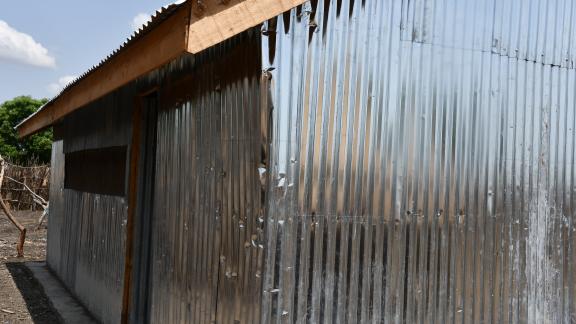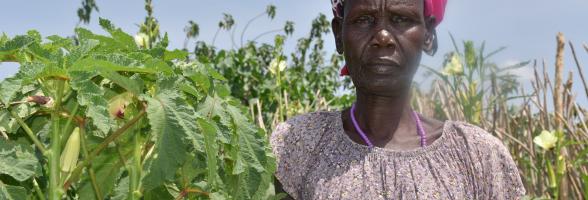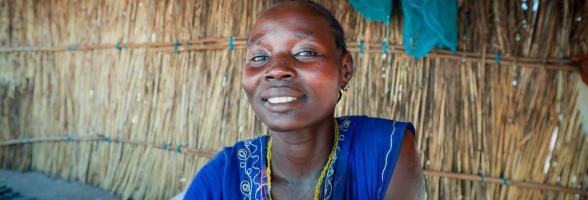Tabitha Nyabang a 32-year-old mother of six lives in Dengjock talks about some of the major challenges women face in Dengjock payam of Akobo East.
“For women here in Dengjock, our major problem is lack of safe space to discuss issues such as gender-based violence and sharing business ideas or how to have a peaceful home free from violence as women ” Tabitha explained.
The absence of safe spaces in Jonglei State severely restricted women from addressing issues that impact their lives, leaving them vulnerable to a myriad of challenges.
Oxfam working with women groups in the state supported the construction of women friendly spaces which allowed the women to have the privacy and protection to address and talk about issues facing them. Tabitha says that after Oxfam constructed the women friendly space, it has lifted the heavy weight out of their shoulders because now they are able to meet on monthly basis.
“When we were consulted about a piece of land for the construction, we felt so happy that finally something is being done for us.We availed the land for the construction and other facilities, we are now able to meet and talk about things that affect us as women in Denjock and Gakdong in this friendly space. Every month a total of 25 women come together in this place to share ideas that benefit them”, with smile a reflection of the profound impact this space has had on the Dengjok and Gakdong community.

Women friendly space building in Dengjock. Photo credit: Yangi Justine/ Oxfam
Consultative meetings were held with local authorities and existing women’s groups to identify priority locations for the construction of the safe spaces.
The purpose was to provide a place where women and adolescent girls are able to receive information on, Sexual Reproductive Health and Rights, Sexual Gender Based Violence, and Protection from Sexual Exploitation and Abuse Information Education Communication (PSEA-IEC) materials and other available services for women including economic empowerment activities.
The safe spaces were equipped with chairs, tables and other materials and supplies to enable women to conduct their activities such as monthly meetings, trainings, and information dissemination sessions.
For economic activities, bed sheets materials and beads were provided to enable e women to make bed sheets and beads for sale. These were identified by the women themselves. Training was provided to the women on how to manage income generating activities. Latrines were constructed in safe spaces through the Water Sanitation and Hygiene activities.
Oxfam with support from Global Affairs Canada-GAC implemented a two-year integrated WASH, Protection and Gender response targeting over 81,450 (23,509 women; 16,086 men; 21,509 girls; 20,346 boys) vulnerable IDPs, returnees and host communities affected by conflict and displacement, with a particular focus on PLWDs and SGBV survivors, residing in Bilkey, Dengjock, Nyandit and Gakdong Payams of Akobo County and Pibor town, Pibor North/South, Gumuruk, Lekuwangole, Verthet Payams of GPAA of Jonglei State.
The project ensured a safe, inclusive and dignified access to basic WASH and Protection services. Oxfam also mainstreamed gender through a community-based approach in coordination with local communities, authorities and international partners.
Oxfam under protection, enhanced use of lifesaving, safe, gender-sensitive, rights-based protection and SGBV services to over 9,400 vulnerable people (3,290 women; 940 men; 3,760 girls; 1,410 boys) through interconnected community-based capacity development and delivery modalities. Two safe spaces were constructed and designated in Bilkey and Denjock Payam.


